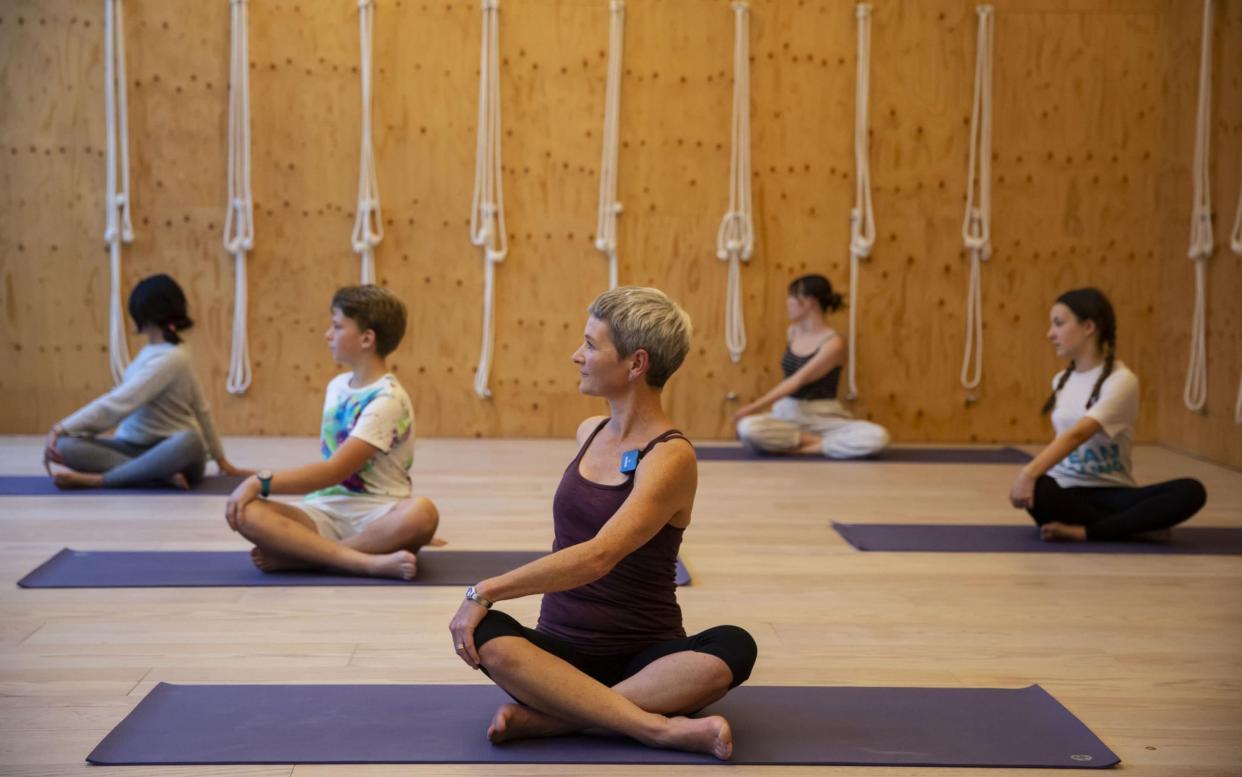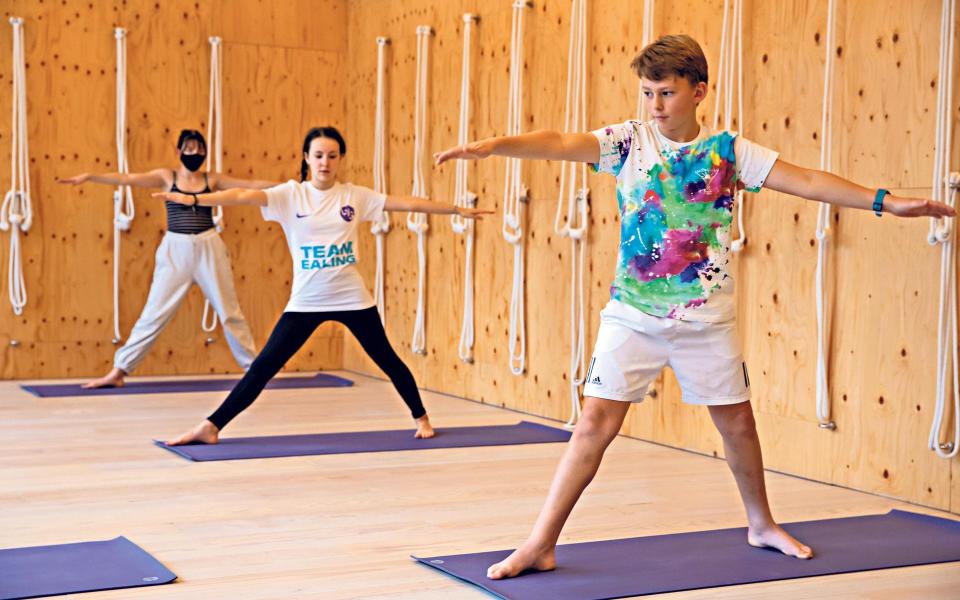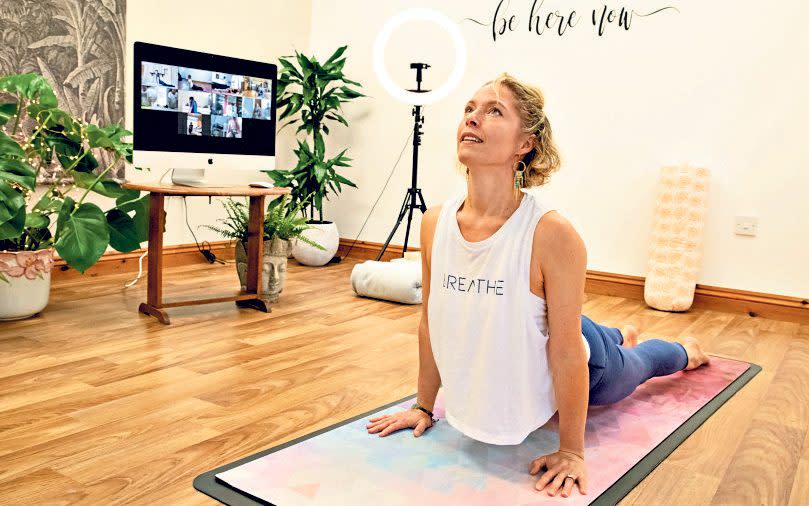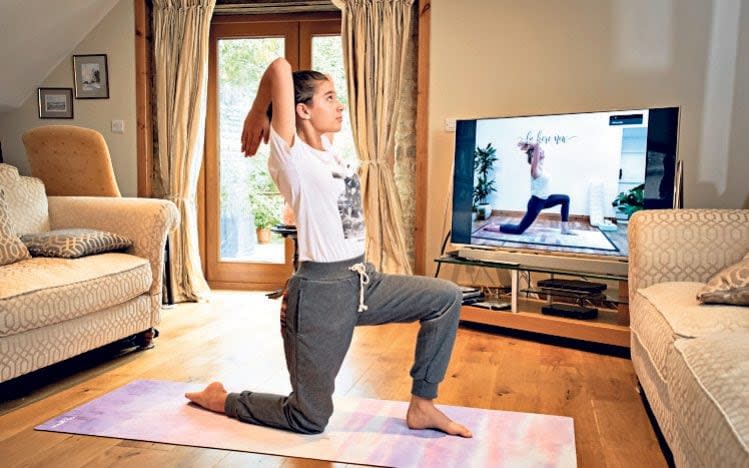Could yoga be the cure for teenage coronanxiety? It's not such a stretch

Theresa Joseph had been highly academic at GCSE level. But in year 11, her grades suffered because of a long commute to a new school from her Cardiff home. “I’m really academic and was reliant on the exam to fix my grade,” she says. Then, lockdown happened, throwing the teen’s world into disarray.
“It looked like I wasn’t going to get an opportunity to sit the exam. It was an awful time, I wasn’t sleeping, I was down all the time to the point of depression. I’d get overwhelmed by my thoughts, I didn’t know what to do. It was so dark.”
To deal with all her anxiety, Theresa, 18, searched online for something physical she could do as part of her Duke Of Edinburgh award. Two options were “Couch to 5K” or trying out a yoga course on Zoom. “I didn’t want anything too active,” she laughs. She signed up for weekly yoga with a teacher named Lizzie Ward at the start of lockdown. “I didn’t hold out much hope, but I gave it a go,” says Theresa.
Twelve weeks later, before her online mocks, Theresa’s familiar anxiety returned. But this time, to her own surprise, she had a tool to manage it. “I thought I was having a mental breakdown,” she says.
“But what helped me so much was the simple technique of counting my breaths that I learned in Lizzie’s classes. I panic as soon as I hear the word ‘exam’ but, with Lizzie’s tips, every time I felt anxious I would focus on my breathing first, and then the panic would stop.
I was able to organise my thoughts, calm down and think, ‘Right what can I do now?’ Now, whenever I feel overwhelmed, I use the techniques I learned in yoga. That’s a special feeling – being able to calm yourself like that.”
Theresa is not alone in having found yoga beneficial this year. Research from Withings found a staggering 42 per cent increase in people doing yoga during lockdown. But the need for calm seems even more pressing for teens in particular, because of the impact the pandemic is having on their mental health.

In June, University of Cambridge researchers warned of a teen mental health time bomb as face-to-face interaction is so essential to brain development between the ages of 10 and 24. Indeed, research by Oxford University ARC (Achieving Resilience During Covid-19) found teenagers reported higher levels of anxiety and depression than their parents during lockdown.
The word “overwhelmed” comes up a lot when you talk to teenagers about how they felt during lockdown. For Holly Johnson, 15, not being able to physically see a teacher and have that face-to-face contact was upsetting. “I was working up to my mock GCSEs and when lockdown happened, I would get so anxious about the workload,” she says.
“And with subjects I wasn’t very good at like English, learning without a teacher was difficult. I’d get so overwhelmed and upset by it all.” Holly had been doing yoga sporadically at London studio Triyoga for the last two years. But it was during lockdown – when their classes went online – that she came to rely on yoga to help her unwind each week.
“The amount of work I was getting was ridiculous, and I was having trouble sleeping,” she says. “But after that 4pm yoga class on Saturdays, my worries of the week would just go away and that night at least I would sleep like a baby.”
According to Dr Nihara Krause, a consultant clinical psychologist specialising in adolescents and CEO of teenage mental health charity stem4: “The teenage brain is naturally more anxious because stress hormones such as corticosteroids are higher as the brain grows and develops until they reach 25.
“But the uncertainty the pandemic has brought with it has created even more anxiety for teenagers because nothing seems to be hugely reliable in their lives anymore. That’s important because predictability makes young people feel more in control and safe. Suddenly, that’s gone.
“Things they used to take for granted, like sitting their exams, have changed. Their educational goals have been disrupted. As a result they’re feeling a lack of emotional safety, which is why so many this year report feeling anxious, fearful and overwhelmed.”
And that is where yoga, and the creation of a “safe space to share” can help. Creating a psychologically safe space around the yoga mat where teens can be themselves and share their experiences and feelings is a key difference between teen yoga and adult yoga, says teen yoga teacher Ward.

She began delivering Zoom yoga to teens (including Theresa) as part of a DofE award after seeing how anxious her preteen daughter Emily was at the start of lockdown.
“I could see her breathing into her chest more and also her need for more belonging and community with school taken away,” says Ward. So keen was the response from teens in lockdown that, next January, Ward will launch a dedicated Teen Yoga Studio platform.
“The ultimate aim in teen yoga is to get them out of their heads and into their bodies, through breath and movement,” she says. “But we also encourage the teens to share how they are feeling at the start of every class.” And, though that would mortify an adult yoga-goer, the teens quite like it.
“The mat becomes a safe place where all the pressure of looking a certain way, performing in school or keeping up with social media are gone and they can not only share how they’re feeling but also discover ways they can regulate and manage those feelings,” adds Ward. “Learning that kind of self-management is hugely empowering and confidence-boosting for young people.”
At her first yoga class, Theresa was terrified – the Zoom experience made her feel self-conscious and awkward. “I was worried about my messy at-home look and everyone seeing inside my house,” she says. “I don’t know how she did it but Lizzie put me at ease. She asked us all how we were feeling and seemed to know what we were all going through.”
Every week, each class had a theme and the first one was “Believing in Yourself,’’ remembers Theresa. “I was at a point where I felt I wasn’t worth it, and Lizzie kept giving tips on how to focus on confidence through the movements, from feeling your feet on the ground to holding yourself upright in a warrior pose, and that really helped me,” she explains. “During the lying down bit at the end I felt rested and for the first time since before lockdown, like nothing was holding on to me anymore. It was the nicest feeling in the world.”
Yoga can boost physical confidence in young people who consider themselves not particularly physically able too. Theresa, for example, isn’t a sporty type. “Yoga’s kind of active but it doesn’t come with the stress that comes with sport,” she says. “Especially in lockdown, I needed something that made me feel free, and helped me relax without more pressure and yoga did that.”
Indeed, for young people who aren’t traditionally sporty, yoga is something they can do that involves movement, but isn’t competitive so it doesn’t cause them more stress, says Suzanne Gribble, teen yoga teacher at Triyoga. “The flipside of that is they often end up seeing themselves doing things they would never have thought they would be able to do and that increases their confidence and self-esteem.”
At the start of lockdown, Charlotta Martinus – a former schoolteacher turned yoga teacher who founded the Teen Yoga Foundation in 2015 and has taught yoga to around 15,000 teens since 2003 – predicted what she calls a “mental health explosion waiting to happen” in young people. Martinus runs teen yoga training for teachers and her graduates teach yoga in schools, detention centres, hospitals, clinics and studios.
“Young people need to be in groups, and to explore life away from their families,” she says. “Suddenly they were going to be locked down with their families – in what we know for some would be abusive environments – with no outlets. That was not going to be good for their mental health.”
Martinus galvanised her teen yoga teacher graduates to deliver a live session each morning at 10am through their “Yoga In Schools” YouTube channel, amassing around 5,000 hits across lockdown’s 66 days. “A lot of young people were at home bored and wanted to do something that felt good, would move their bodies and also address their anxieties.”
Yoga has got quite cool too. “It’s gone from something little kids or older ladies did to something that Daniel Craig, Lady Gaga and a gaggle of influencers do and that has helped enlist more teens,” says Martinus. In fact, Ward’s Teen Yoga Studio platform (due to launch in January) will feature classes by Flo Cross who, at just 16, is the UK’s youngest yoga teacher.
Emily Ward, 12, started doing yoga to get out of what she calls the “anxious bubble” that she was in during lockdown. Her yoga teacher mother Lizzie started teaching her things like “lion’s breath,” where you poke out the tongue and exhale heavily like a lion to help instill calm.
“It was quite fun and really worked,” remembers Emily. “So I started going along to mum’s Zoom classes initially sceptical about the whole thing. But I found that while I would have a busy mind with too much going on at the start of the class, by the end I would feel like going to sleep. It calmed my mind like nothing else.”
But when Emily’s friends complained to her about their own anxiety and she mentioned yoga, they pooh-poohed the idea. “A lot of them had worse anxiety than me but, when I suggested yoga, they were like, ‘Isn’t yoga for little kids and older women having a midlife crisis?’ But I taught them some of the breathing techniques I learned and I think it helped them,” says Emily, whose experience isn’t unusual.
“We found a lot of our young people would go and teach their little siblings or parents or friends a technique for stress or sleep they learned in yoga,” says Martinus. “That happens a lot – the teenager gets to have a role in the family of being responsible and supportive instead of kicking against it and that increases their status within the family and helps them to grow more independent.”
At the moment, it seems that yoga appeals more to teenage girls than boys. But Martinus is trying to change that. “Our big thing for the last five to six years was a campaign to get more teenage boys into yoga,” she says. “We have achieved that through encouraging teachers to be more risky with the yoga they teach. Emphasising hip-hop inspired moves like plank into crow or handstands, which target areas such as the pectoral muscles and chest, has attracted more boys.”
Then, there’s the fact that the England rugby team do yoga. “We might show videos of that and encourage the boys to push their abilities and take more risks with posture to improve their football, swimming or rugby game,” she says. “But, to be honest, often what is truly risky for the boys is to just close their eyes and stop doing things; to just let go. So sometimes the biggest risk they take is the savasana or lying-down relaxation at the end.”
The benefits of yoga for teenagers

Calming anxiety
“Yoga teaches young people to observe the physical experience of anxiety in their bodies and provides tools, such as movement, mindfulness and breathing, to regulate and calm it,” explains Triyoga teacher Suzanne Gribble.
Self-regulation
“This is helpful in psychological conditions, such as eating disorders and addictive behaviours, where quite often people can have an on/off switch and nothing in between – yoga may help people learn to have a dimmer switch and control their impulses and behaviours better,” says adolescent psychologist Dr Nihara Krause.
Self-soothing
“By teaching them healthy ways to cope with feelings such as anger, or upset or when their family is getting on their nerves, yoga can give teens tools that help them make themselves feel better. That helps them become more able to step into an adult world,” says teen yoga specialist teacher Charlotta Martinus.
Focus and concentration
“Some children with hyperactivity spectrum disorders, such as ADHD and other impulse regulation difficulties, can benefit from activities like yoga that help them practise focus, even if it is only in small amounts,” says Dr Krause. “They might not like it to begin with, because it will prove hard, but they may benefit.”
See: The Telegraph's guide to the best yoga mats

